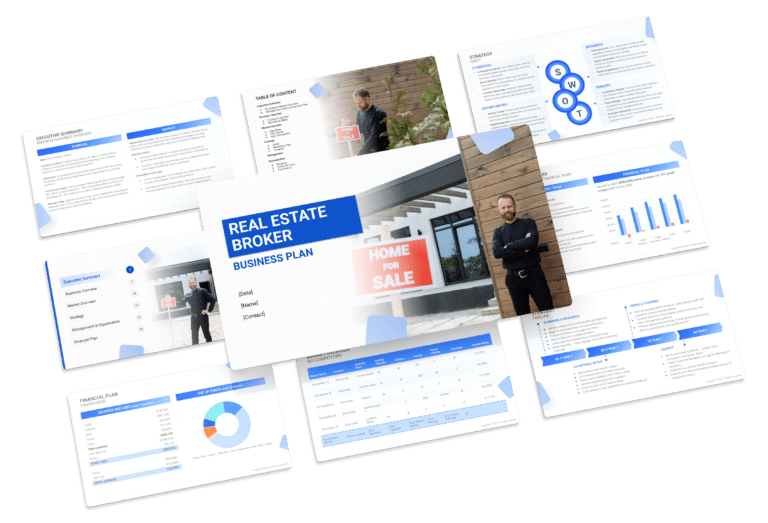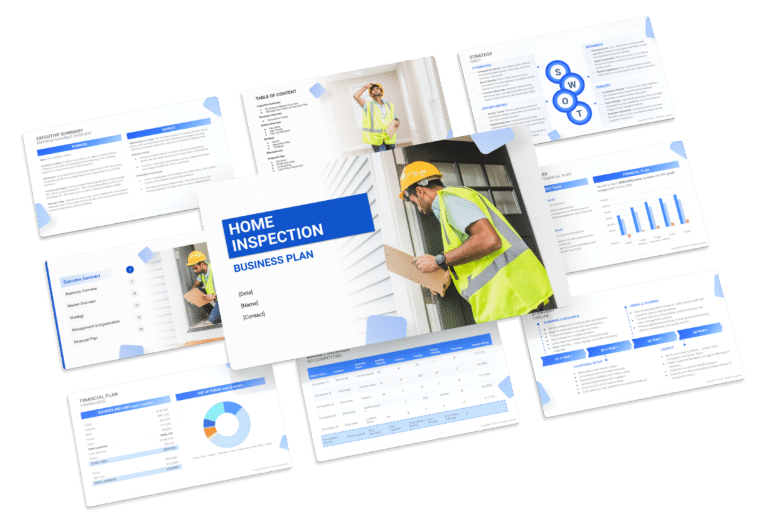Real Estate Agency Business Plan Template & PDF Example

Creating a comprehensive business plan is crucial for launching and running a successful real estate agency. This plan serves as your roadmap, detailing your vision, operational strategies, and financial plan. It helps establish your real estate agency’s identity, navigate the competitive market, and secure funding for growth.
This article not only breaks down the critical components of a real estate agency business plan, but also provides an example of a business plan to help you craft your own.
Whether you’re an experienced entrepreneur or new to the real estate industry, this guide, complete with a business plan example, lays the groundwork for turning your real estate agency concept into reality. Let’s dive in!
The Plan
Our real estate agency business plan covers all essential aspects necessary for a comprehensive strategy. It details operations, marketing strategy, market environment, competitors, management team, and financial forecasts.
- Executive Summary: Provides an overview of the real estate agency’s business concept, market analysis, management, and financial strategy.
- Business Overview: Delivers detailed information on the agency’s operations and services:
- Real Estate Brokerage Services & Fees: Describes the brokerage services including property sales and acquisitions, along with a fee structure.
- Property Management Services & Fees: Outlines property management services offered and their respective fees.
- Market Overview: Reviews the real estate industry landscape, identifying competitors and unique positioning:
- Key Stats: Offers data on industry size, growth trends, and market positioning.
- Key Trends: Highlights significant trends impacting the industry, such as digital transformation and changing buyer preferences.
- Key Competitors: Analyzes primary competitors and differentiates the agency from these competitors.
- Strategy: Details the agency’s strategy to achieve growth and secure market share:
- SWOT: Analyzes strengths, weaknesses, opportunities, and threats.
- Marketing Plan: Outlines tactics for attracting new clients and maintaining relationships.
- Timeline: Sets out key milestones from inception through the first year of operations.
- Management: Information on the management team and their roles within the agency.
- Financial Plan: Projects the agency’s financial performance over the next five years, detailing revenue, profits, and anticipated expenses.

Executive Summary
The Executive Summary introduces your real estate agency’s business plan, offering a concise overview of your agency and its services. This section outlines your market positioning, the variety of real estate services offered—including property sales, rentals, and property management—its location, size, and a description of day-to-day operations.
This section should also discuss how your real estate agency will integrate into the local market, including the number of direct competitors within the area, identifying who they are, along with your agency’s unique selling points that differentiate it from these competitors.
Additionally, you should include information about the management and co-founding team, detailing their roles and contributions to the agency’s success. Furthermore, a summary of your financial projections, including revenue and profits over the next five years, should be presented here to provide a clear picture of your agency’s financial plan.
Real Estate Agency Business Plan Executive Summary Example

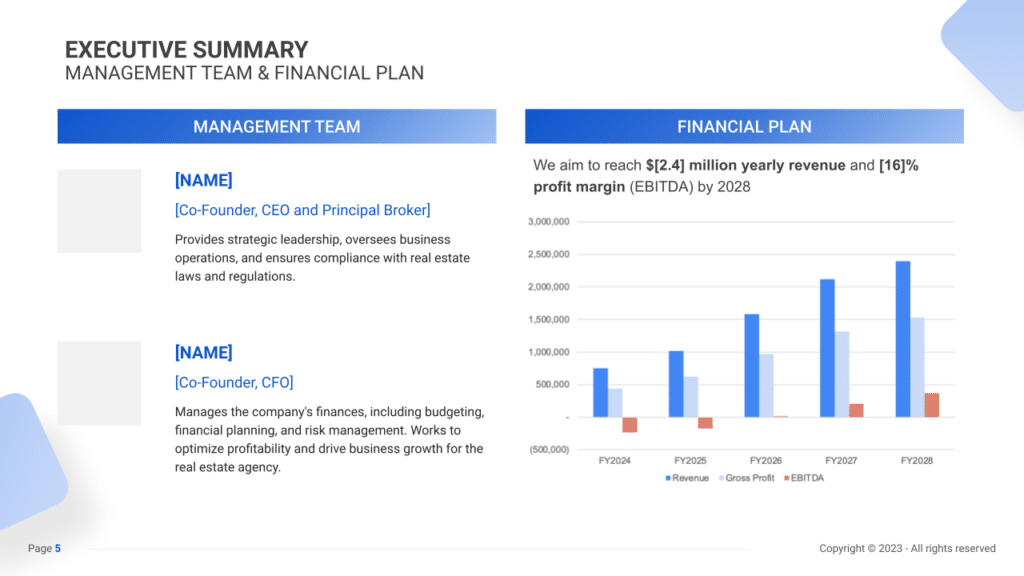
Business Overview
In this section, introduce your real estate agency with essential details such as its name, location, and core services. Highlighting your agency’s unique selling proposition (USP) distinguishes it amidst a competitive landscape. Whether it’s a focus on personalized client experiences, specialized market segments, or innovative technology integration, your USP should shine through.
Example:
For instance, “Prime Properties Realty,” headquartered in bustling downtown Manhattan, boasts a dedicated team of tenacious real estate professionals. Our agency specializes in comprehensive property management solutions and bespoke brokerage services, priding ourselves on a client-centric approach that blends cutting-edge technology with old-fashioned integrity.
Market Overview
This section delves into the broader real estate market, providing insights into its size, growth trends, and current dynamics. Utilize relevant data to underscore the potential of the market and articulate how your agency navigates within it. Discussing emerging trends and competitive analysis offers valuable context for your agency’s positioning and growth strategy.
Example:
Consider Prime Properties Realty within the U.S. real estate market, valued at a staggering $243 billion in 2023. With a steady annual growth rate of 3.94%, the industry presents ample opportunities for strategic expansion. Trends such as the increasing demand for virtual tours and smart home solutions underscore the importance of technological innovation, while a competitive landscape comprising local agencies and national firms necessitates a differentiated approach.
Management Team
Highlighting the expertise and experience of your management team instills confidence in potential investors and partners. Showcase key qualifications and achievements, emphasizing how each member contributes to the agency’s success. Whether it’s decades of industry experience, specialized knowledge in niche markets, or a track record of driving growth, the management team serves as a cornerstone of credibility.
Example:
At Prime Properties Realty, founders Emily Johnson and Michael Chen lead the charge with a combined 30 years of real estate expertise. Emily’s background in corporate strategy and market analysis complements Michael’s proficiency in negotiations and client relations, ensuring a dynamic leadership that drives innovation and excellence.
Financial Plan
Concluding the executive summary, provide a concise overview of your agency’s financial goals and projections. Outline revenue targets, profit margins, and key strategies for achieving sustainable growth. By articulating a clear financial trajectory, you demonstrate your agency’s viability and potential for long-term success.
Example:
Prime Properties Realty aims to achieve $2.4 million in annual revenue with a solid 16% profit margin (EBITDA) by 2028. This ambitious yet attainable goal is supported by strategic investments in technology infrastructure, aggressive marketing initiatives, and ongoing professional development for our team members. With a prudent financial strategy and a relentless pursuit of excellence, we are poised to emerge as a market leader in the dynamic real estate landscape.
Business Overview
For a Real Estate Agency, the Business Overview section can be concisely divided into 2 main slides:
Real Estate Brokerage Services & Fees
Briefly describe the agency’s professional and welcoming office environment and its conveniently located premises near major residential and commercial areas, which enhances accessibility and client traffic. Detail the range of real estate brokerage services including buying, selling, and leasing properties, and discuss the agency’s fee structure, which is typically based on a percentage of the property sale or lease price, reflecting the high quality of service and market alignment.
Property Management Services & Fees
Describe the comprehensive property management services offered that cover tenant screening, rent collection, maintenance, and financial reporting. The pricing for these services is usually based on a percentage of monthly rental income or a flat monthly fee, with potential additional charges for special services like emergency maintenance or tenant placement, ensuring landlords a hassle-free ownership experience.
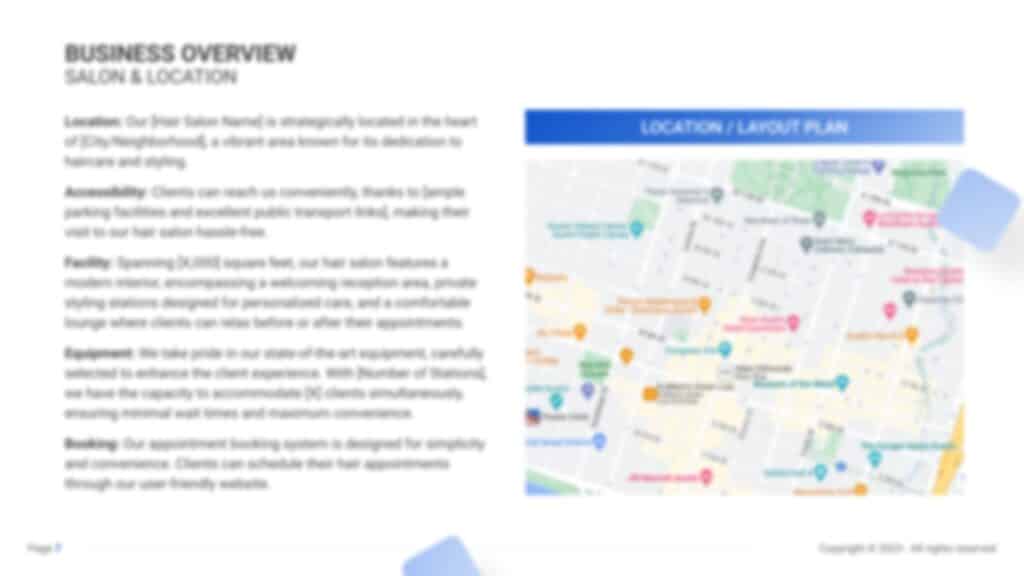
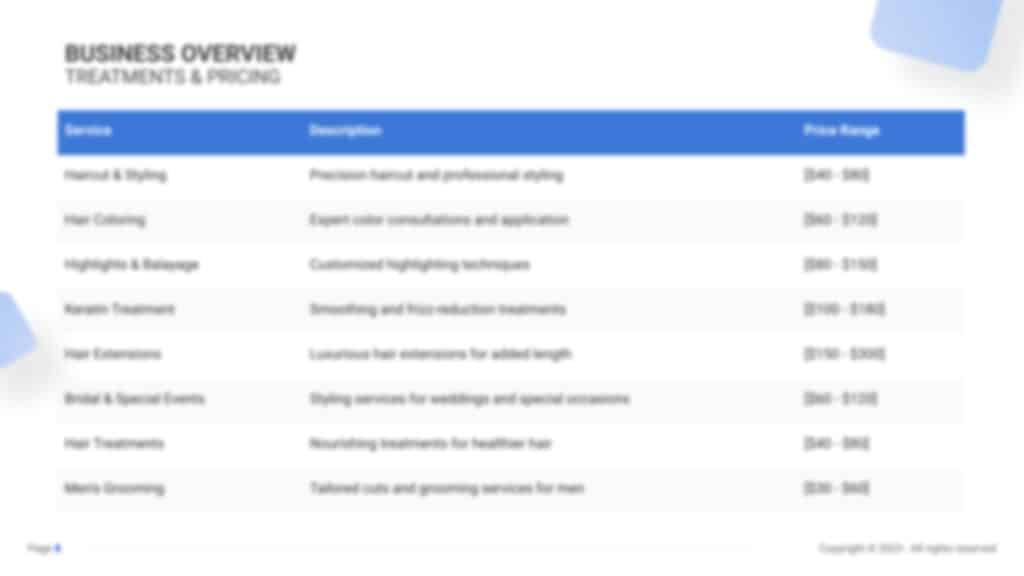
Market Overview

Industry Size & Growth
In the Market Overview of your real estate agency business plan, start by examining the size of the real estate industry and its growth potential. This analysis is crucial for understanding the market’s scope and identifying expansion opportunities.
Key Market Trends
Proceed to discuss recent market trends, such as the increasing consumer interest in sustainable and eco-friendly properties, the growing demand for smart homes equipped with the latest technology, and the rising popularity of urban living spaces among millennials and young professionals. For example, highlight the demand for properties that cater to specific lifestyle needs, alongside the rising preference for locations with comprehensive amenities and green spaces.
Competitive Landscape
A competitive analysis is not just a tool for gauging the position of your real estate agency in the market and its key competitors; it’s also a fundamental component of your business plan.
This analysis helps in identifying your real estate agency’s unique selling points, essential for differentiating your business in a competitive market.
In addition, the competitive analysis is integral in laying a solid foundation for your business plan. By examining various operational aspects of your competitors, you gain valuable information that ensures your business plan is robust, informed, and tailored to succeed in the current market environment.
Identifying Your Competitors in the Real Estate Industry
The first step in conducting a competitive analysis for a real estate agency is identifying key competitors. These competitors may include other local real estate agencies, independent agents, and even online platforms that facilitate property transactions.
Utilize online tools such as real estate listing websites, social media platforms, and search engines to identify competitors operating in your target market. Pay attention to their areas of specialization, market presence, and client demographics.
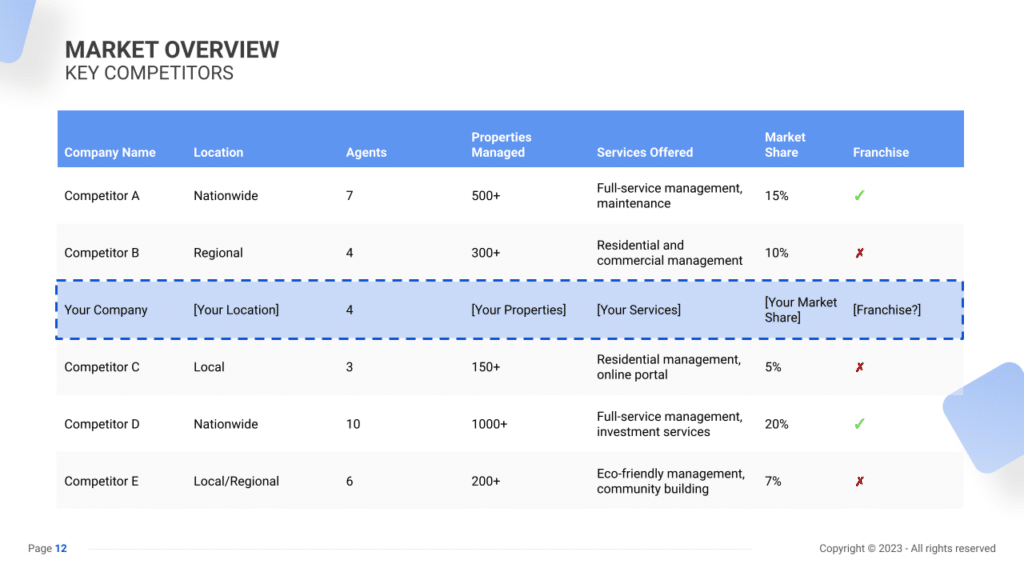
Real Estate Agency Competitors’ Strategies
Once competitors have been identified, delve into analyzing their strategies across various dimensions:
- Service Offerings: Evaluate the range of services offered by competitors. Some agencies may specialize in residential properties, while others may focus on commercial real estate or niche markets like luxury properties or vacation rentals.
- Marketing Tactics: Assess competitors’ marketing tactics and channels. Do they invest heavily in digital marketing, traditional advertising, or networking events? Analyze the effectiveness of their marketing efforts in reaching and engaging potential clients.
- Pricing Structure: Compare the pricing structure of competing agencies. Consider factors such as commission rates, service fees, and any additional charges. Determine whether competitors position themselves as budget-friendly options or premium service providers.
- Technology Adoption: Examine competitors’ use of technology in their operations. This includes the adoption of customer relationship management (CRM) software, virtual reality tours, and online property listings. Evaluate how technology integration enhances the customer experience and streamlines internal processes.
- Client Relationships: Investigate how competitors nurture client relationships and provide value-added services. This may include personalized property recommendations, market insights, and assistance throughout the buying or selling process.
What’s Your Agency’s Value Proposition?
Armed with insights from the competitive analysis, it’s essential to define your real estate agency’s unique value proposition. When crafting your agency’s value proposition, consider factors such as specialization, service differentiation, technology integration, and a client-centric approach.
Highlight any areas of specialization or expertise that set your agency apart from competitors. This could include expertise in a particular neighborhood, property type, or client demographic.
Identify ways to differentiate your agency based on the quality and range of services offered. Whether it’s providing personalized property tours, comprehensive market analysis, or innovative marketing strategies, emphasize how your agency goes above and beyond to meet client needs.
Showcase your agency’s commitment to leveraging technology to enhance the real estate experience. Whether it’s offering virtual property tours, implementing advanced analytics tools, or providing an intuitive online platform for property search, emphasize how technology drives efficiency and convenience for clients.
Emphasize your agency’s dedication to delivering exceptional customer service and building long-term relationships with clients. Highlight testimonials, case studies, and success stories to illustrate your agency’s track record of client satisfaction and success.
Strategy

SWOT
First, conduct a SWOT analysis for the real estate agency, highlighting Strengths (such as experienced realtors and a diverse property portfolio), Weaknesses (including high agent turnover or reliance on local market conditions), Opportunities (for example, the growing demand for rental properties or the potential for tapping into luxury real estate markets), and Threats (such as fluctuations in real estate prices or new housing regulations that may impact operations).
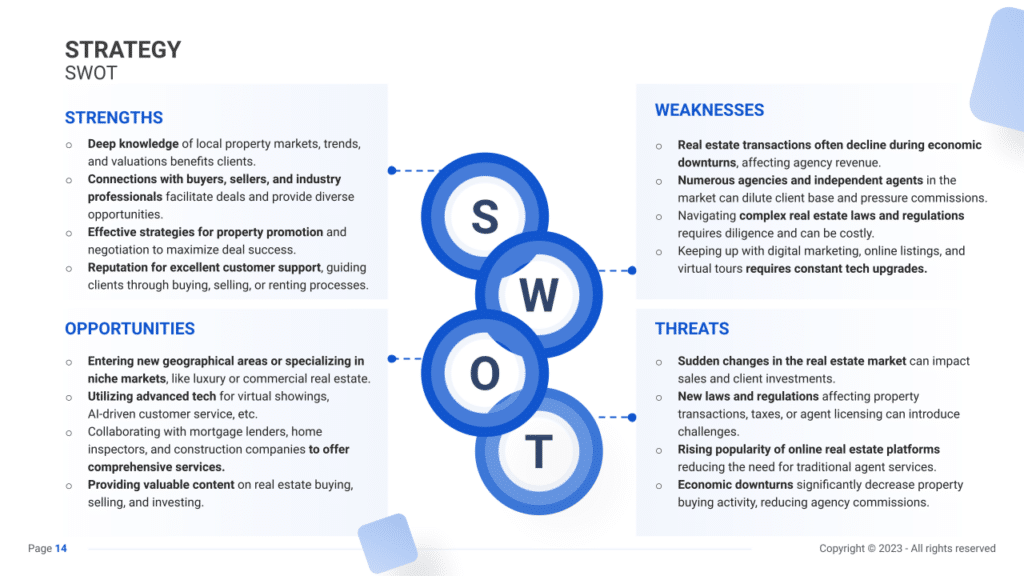
Marketing Plan
Next, develop a marketing strategy that outlines how to attract and retain clients through targeted advertising, promotional events like open houses, an engaging online presence, and community involvement. This strategy should also incorporate using social media platforms to showcase properties and share customer testimonials, enhancing the agency’s visibility and client engagement.
Marketing Channels
Utilize various channels to connect with potential clients and reinforce your brand.
Digital Marketing
- Website and SEO: A well-optimized website serves as the centerpiece of your digital presence. Beyond listing properties, a website should offer valuable resources, agent profiles, blog content on market trends, and FAQs to address client queries. Local Search Engine Optimization (SEO) techniques are crucial to ensure visibility in local property searches.
- Social Media: Leveraging social media platforms is indispensable in today’s marketing landscape. LinkedIn is ideal for professional networking and B2B connections, while platforms like Instagram and Facebook offer opportunities for visual storytelling through property highlights, client testimonials, and engaging content. YouTube can be utilized for virtual property tours, educational videos, and neighborhood insights.
- Email Marketing: Email marketing remains a powerful tool to nurture client relationships. Crafting targeted email campaigns that include property updates, market trends, success stories, and personalized messages enhances engagement and reinforces your agency’s expertise and credibility.
Local Advertising
- Networking Events: Attend local real estate networking events, chamber of commerce meetings, and industry conferences to foster connections and generate leads.
- Local Sponsorship: Support community events or charities to increase brand visibility. Consider sponsoring neighborhood newsletters or local podcasts.
Promotional Activities
Entice potential clients with appealing offers and incentives.
- Open House Events: Hosting exclusive open houses is an effective way to showcase properties and create a welcoming environment for prospective buyers. Offering refreshments, interactive property tours, and informational sessions about the local area or housing market trends can elevate the open house experience.
- Referral Programs: Encouraging satisfied clients to refer others can be a powerful marketing tool. Implementing referral programs that reward clients with incentives, such as discounts on future transactions or gift vouchers, motivates them to advocate for your agency among their networks. Acknowledging and appreciating referrals strengthen the bond between your agency and existing clients while expanding your client base.
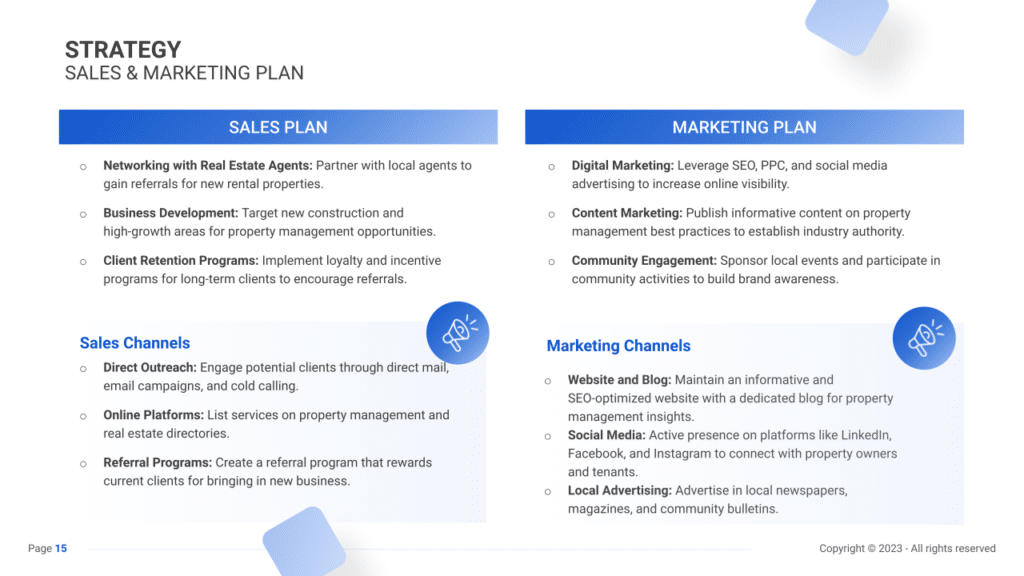
Sales Channels
Maximizing sales strategies and providing comprehensive services contribute significantly to successful transactions and satisfied clients.
Agent Upselling
- Additional Services: Offer clients comprehensive services beyond property listings, such as staging advice, home valuation consultations, or connections to reliable contractors. This comprehensive approach not only assists clients through the transaction process but also establishes your agency as a trusted resource in real estate matters.
- Value-added Services: Provide resources like relocation guides, mortgage assistance, or legal advisory services.
Online Sales and Booking
- Property Listing Platforms: Ensuring an efficient online presence on real estate listing platforms is essential. Active and engaging listings with high-quality visuals, detailed descriptions, and accurate information attract potential buyers and sellers
- Online Transactions: Streamlining the transaction process through secure online platforms for inquiries, appointments, and documentation fosters convenience and expediency, catering to the preferences of modern clients.
Client Relationship Management
- Follow-up Procedures: Implement effective follow-up protocols after property viewings or transactions to maintain communication and address client queries.
- CRM Software: Utilize customer relationship management software to organize client information, track interactions, and personalize future engagements.
Strategy Timeline
Finally, create a detailed timeline that outlines critical milestones for the real estate agency’s launch, marketing initiatives, client acquisition, and expansion goals. This timeline should ensure that the business moves forward with clear direction and purpose, setting specific objectives for brand establishment, market penetration, and long-term growth.

Management
The Management section focuses on the real estate agency’s management and their direct roles in daily operations and strategic direction. This part is crucial for understanding who is responsible for making key decisions and driving the real estate agency toward its financial and operational goals.
For your real estate agency business plan, list the core team members, their specific responsibilities, and how their expertise supports the business.


Financial Plan
The Financial Plan section is a comprehensive analysis of your financial projections for revenue, expenses, and profitability. It lays out your real estate agency’s approach to securing funding, managing cash flow, and achieving breakeven.
This section typically includes detailed forecasts for the first 5 years of operation, highlighting expected revenue, operating costs and capital expenditures.
For your real estate agency business plan, provide a snapshot of your financial statement (profit and loss, balance sheet, cash flow statement), as well as your key assumptions (e.g. number of customers and prices, expenses, etc.).
Make sure to cover here
_ Profit and Loss
_ Cash Flow Statement
_ Balance Sheet
_ Use of Funds






